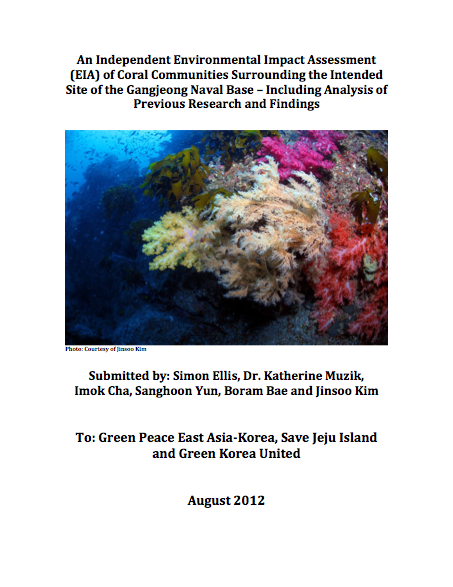
Environmental Assessment recently released by Simon Ellis, Dr. Katherine Muzik, Imok Cha, Sanghoon Yun, Boram Bae and Jinsoo Kim, regarding the destructive impact the Jeju Naval Base will have on the soft coral communities of in and around Gangjeong. From the Report:
1.0 Executive Summary The purpose of this EIA was to independently assess the health and threats to the unique coral communities in the Gangjeong area, which are threatened by the construction of the Gangjeong naval base. A field site visit was made to Gangjeong on Jeju, South Korea from August 20-25th, 2012. Six days of survey diving were planned but bad weather curtailed this work to the study of only two sites immediately adjacent, east and west of the base construction site. Results from the underwater surveys and a review of existing literature and reports pertaining the to base construction and Jeju’s coral populations were used to formulate the following findings and recommendations:
- Construction of the Gangjeong naval base will cause immediate death to thousands of endangered coral species by being crushed or smothered with sedimentation.
- Long term sedimentation caused by the construction of the base will reduce food availability and increase stress to the coral populations leading to a decrease in coral recruitment and population health.
- Release of heavy metals and other pollutants into the environment from dredging and filling activities will also stress and potentially kill corals in the areas surround the base.
- Reduced and changed current patterns around the base will lead to the demise of the coral populations directly east and west of the seawalls. In addition, changes to current patterns may alter water flow to ecologically important areas such and Train Rock and Tiger Islet.
- Increases in concentrations of the biofouling agents TBT and copper can be expected with increased boat traffic in and out of the base. These biocides inhibit invertebrate reproduction and larval settlement, including corals.
- Small and constant leakages of oils, fuels and other contaminants from machinery into the waters around the base can be expected. Once dispersed by wave action these poisons can affect coral growth and survival.
- Propeller wash from the constant large boat traffic in and out of base has a strong potential to cause physical trauma to ecologically important coral populations around Train Rock.
- Increased sedimentation and pollutants combined with current flow changes and trauma from propeller wash will decrease the coral populations and reduce biodiversity in the area. In addition, coral populations will have a reduced ability to spread to new areas due to loss of habitat from sedimentation and lower reproductive success.
- A major oil leak from the base would cause long-term and possibly irreparable damage to the coral populations in the area.
 Click to Download: An Independent Environmental Impact Assessment (EIA) of Coral Communities Surrounding the Intended Site of the Gangjeong Naval Base – Including Analysis of Previous Research and Findings
Click to Download: An Independent Environmental Impact Assessment (EIA) of Coral Communities Surrounding the Intended Site of the Gangjeong Naval Base – Including Analysis of Previous Research and Findings
